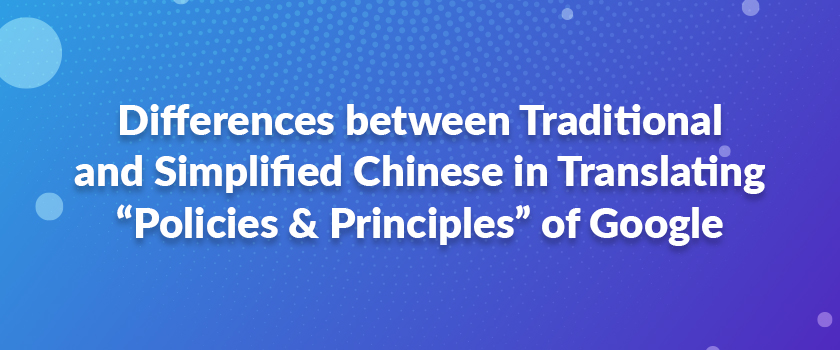Differences between Traditional and Simplified Chinese in Translating “Policies & Principles” of Google
It is known that there are differences between traditional Chinese in Taiwan and HongKong and simplified Chinese in Mainland China not only in form, but also in style and expression. Different expressions are used in traditional Chinese and simplified Chinese when translating the same word. This article will introduce some different expressions between traditional and simplified Chinese in translating “Policies & Principles” of Google.
Firstly, traditional Chinese pays more attention to the conciseness of words and expressions, especially in Taiwan’s traditional Chinese: e.g.
English Taiwan Mainland HongKong
This stuff matters 事關您的權益 此变更关系到您的切身利益 私隱權政策的變更對您極為重要
so please take a few minutes to read our updated 請務必撥冗詳閱新版的 因此请务必花几分钟时间阅读我们的新版 請花點時間詳閱已更新的
Tailored for you 為您量身打造 专门为您量身定制 為您度身訂造
other than rare circumstances 惟少數情況除外 除了极少数的情况 除非是極少數的特殊情況
the first tenet of Google’s philosophy Google 理念的第一信條 Google 十大信条的第一条 Google 經營哲學的首要宗旨
“This stuff matters” translated into “事關您的權益” in Taiwan’s traditional Chinese, which is much more concise and fluent than the other two translations. In the second sentence, “take a few minutes to read” is translated into “撥冗詳閱” in Taiwan’s translation. Comparing with “花几分钟时间阅读”, it is obviously more concise and refined.
Secondly, traditional Chinese pays more attention to the elegance of words and expressions, in other words, traditional Chinese emphasizes the “written” or “formal” feature while simplified Chinese stresses the “spoken” feature of words and expressions:
English Taiwan Mainland HongKong
Policies & Principles 政策與原則 政策和原则 政策和規範
reflecting our desire to create one beautifully simple and intuitive experience across Google. 呼應 Google 訴求簡約、符合直覺的產品設計理念。 目的是在所有 Google 产品中提供精简直观的一致体验。 並反映出我們希望讓用戶在整個 Google 上享有簡單易用的完美體驗。
and visit our to read more about the changes 並前往 進一步瞭解異動內容 并参阅我们的 了解更改详情 並請瀏覽 中關於此項變更的更多資料
Easy to work across Google 在各項產品之間輕鬆遨遊 在各种产品之间轻松切换 方便在整個 Google 上工作
Easy to share and collaborate 輕鬆分享與協同合作 轻松进行分享与协作 方便分享和協作
Protecting your privacy hasn’t changed 為您守護隱私權的初衷從未改變 我们仍将一如既往地保护您的隐私权 對您的私隱權保障始終如一
Ads Preferences Manager 廣告偏好設定管理工具 广告偏好设置管理器 廣告偏好設
定管理工具
Self Regulatory Frameworks 自治法架構 自我监管框架 自律架構
IP address IP 位址 IP 地址 IP 地址
Server logs 伺服器記錄 服务器日志 伺服器記錄
Sensitive personal information 敏感個人資訊 敏感的个人信息 敏感的個人資料
Google Dashboard Google 資訊主頁 Google 信息中心 Google 資訊主頁
Information we get from your use of our services 我們經由您對我們服務的使用而取得的資訊 我们在您使用服务的过程中获取信息 經由您使用有關服務而向我們提供的資料
Unique application numbers 專屬應用程式編號 唯一应用程序编号 應用程式專用編號
Review and control 審閱並控管 查看并控制 審視並控制
View and edit 檢視並編輯 查看和修改 檢視並編輯
Take information 匯出資訊 提取信息 匯出資訊
Focus on providing the best user experience 專注在使用者身上,一切將水到渠成 以用户为中心,其他一切水到渠成 專心致力為用戶提供最優良的使用經驗
In the first line, “&” is translated into “與” in Taiwan’s traditional Chinese while “和” in simplified and HongKong’s Chinese. In the second line, “reflecting” is translated into “呼應”, “目的是” and “並反映出” respectively. In Chinese, “與” is more formal than “和”; “呼應” and “訴求” also sounds more formal than “目的是”. All the other underlined words and expressions have the same feature. For example, in the third line, “changes” is translated into “異動內容”, “更改详情” and “此項變更”, “異動” and “變更” is evidently more formal than “更改”. In line six, “守護”, “保护” and “保障” are used to translate the same word “Protecting”, and “守護” seems having more literary grace than the two others. Others like “設定” ”架構””位址””資訊” ”伺服器””專屬””程式””審閱””控管””檢視” are more formal than the simplified version.
Other words and expressions also reflect the above two features:
English Taiwan Mainland HongKong
Overview 簡介 概述 概述
Privacy 隱私權 隐私权 私隱權
One policy, one Google experience 統一的政策及 Google 整合式服務 统一的政
策,一致的 Google 体验 單一政策,更完美的 Google 體驗
Key terms 主要條款 关键词 主要條款
Anonymous identifier 匿名識別字 匿名标识符 匿名識別碼
Non-personally identifiable information 非個人身分識別資訊 非个人身份信息 非個人的識別資料
Pixel tag 像素標記 像素标签 像素標籤
FAQ 常見問題 常见问题解答 常見問題
Current version 目前版本 当前版本 目前版本
Past versions 過往版本 旧版 過往版本
Principles 原則 原则 規範
Device information 裝置資訊 设备信息 裝置資訊
Log information 紀錄資訊 日志信息 記錄資訊
Location information 位置資訊 位置信息 位置資訊
Local storage 本機存放區 本地存储 本機儲存區
Transparency and choice 資訊透明化和選擇權 透明度和选择 透明度及選擇權
Use our editor 使用我們的編輯器 使用我们的编辑器 使用我們的編輯器
Accessing and updating your personal information 存取及更新您的個人資訊 访问和更新您的个人信息 查閱及更新您的個人資料
With domain administrators 與網域管理員分享 与域管理员分享 與網域管理員分享
this archive 這個封存資料庫 本归档 這個封存
Personal information 個人資訊 个人信息 個人資料
Take a look at how we helped our client by localizing their project for Chinese language. Click here to read the complete case study
From the above table, we can see that HongKong’s traditional Chinese seems standing between Taiwan’s traditional Chinese and mainland’s simplified Chinese, being more concise than simplified Chinese, while not as conciseness as that of Taiwan.



